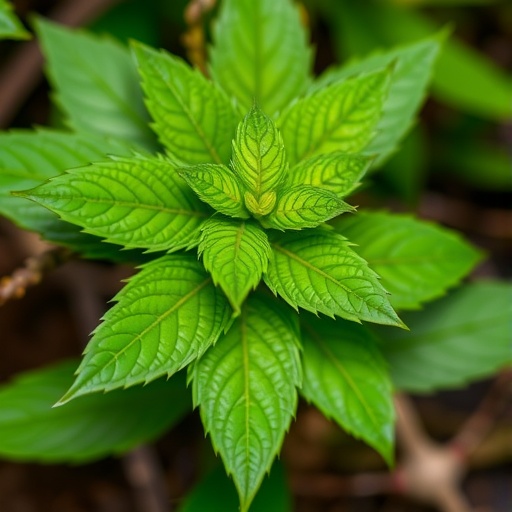In the quest to bridge conventional medicine and alternative therapy, herbal products have emerged as a focal point of interest in health discussions worldwide. This burgeoning interest is notably pronounced in Sri Lanka, where the rich biodiversity and traditional medicinal practices converge to create a unique landscape for herbal medicine. Recent research by Weerakoon, Mannapperuma, and Ranasinghe delves into the availability and composition of herbal products marketed with health benefits specifically targeting chronic non-communicable diseases (NCDs) in the country, a subject meriting deeper exploration and scrutiny.
The study highlights the complex interplay between traditional herbal practices and modern health claims. Chronic non-communicable diseases, such as diabetes, cardiovascular disorders, and chronic respiratory conditions, have emerged as significant public health challenges globally. The pressures of urbanization, lifestyle changes, and dietary shifts have led to a rise in these diseases, compelling many individuals to consider alternative and complementary therapies, including herbal remedies, as adjuncts or substitutes for conventional treatments. Understanding the landscape of herbal products available in Sri Lanka is critical for both consumers and health professionals.
The authors conducted a comprehensive survey that meticulously cataloged various herbal products claimed to possess health benefits related to chronic diseases. The findings underscore a variety of products available in local markets, ranging from well-known remedies derived from traditional practices to commercially produced herbal supplements. The diversity in product offerings reveals a vibrant market influenced by both local traditions and global health trends, indicating a dynamic interaction between indigenous knowledge and modern consumerism.
Despite growing consumer interest, the study raises important questions regarding the efficacy, safety, and regulation of these herbal products. The authors emphasize that not all herbal remedies marketed for therapeutic use are supported by robust scientific evidence. Many products make bold health claims, often lacking rigorous clinical validation or quality control. This presents a dual challenge: protecting consumers from potential harm due to unverified products while fostering an environment where scientifically-backed herbal remedies can thrive.
The composition of these herbal products is equally concerning. The research revealed a concerning lack of transparency in ingredient listing, where many products were found to contain undisclosed fillers or additives. Such practices not only compromise the authenticity of the herbal remedies but also pose health risks to consumers, especially individuals with allergies or sensitivities. The need for strict regulatory frameworks and quality assurance mechanisms becomes evident, as ensuring the safety and efficacy of herbal products is paramount for public health.
Moreover, the study highlights the necessity of educating both consumers and healthcare providers about the potential benefits and risks associated with herbal medicines. With many individuals increasingly turning to herbal options for managing chronic diseases, providing accurate information is crucial in helping consumers make informed decisions. This education should also encompass understanding the importance of consulting healthcare professionals before integrating herbal products into treatment regimens, particularly for those with existing health conditions or those on medication.
Another key finding of the research is the role of cultural perceptions in shaping consumer behaviors towards herbal products. In Sri Lanka, traditional beliefs and practices regarding health and wellness profoundly influence how individuals perceive and utilize herbal remedies. Many consumers hold strong convictions about the efficacy of herbal treatments, often rooted in historical practices passed down through generations. This cultural reverence for herbal medicine can contribute to a reluctance to embrace conventional medical advice, creating a complex dynamic where traditional and modern health paradigms coexist.
In addition to health claims associated with individual herbal products, the authors note an overarching trend towards holistic and integrative approaches to health. Many consumers are not only seeking remedies for specific ailments but are increasingly interested in overall wellness and preventive health strategies. The market for herbal products in Sri Lanka is increasingly reflecting this shift towards a more holistic perspective, where the integration of lifestyle changes, dietary considerations, and mental well-being plays a significant role in health maintenance.
The exploration of herbal products in Sri Lanka is not merely an academic pursuit but has real implications for public health policy. As chronic non-communicable diseases continue to impact populations worldwide, recognizing the role of herbal therapies can inform broader health initiatives and educational campaigns. It is vital for policymakers to consider the potential benefits of integrating traditional herbal practices into national health strategies while ensuring that these practices are backed by scientific evidence and regulatory oversight.
In conclusion, the survey conducted by Weerakoon, Mannapperuma, and Ranasinghe sheds light on an important area of health research that intersects cultural practices, consumer behavior, and scientific inquiry. The findings emphasize the complexity of herbal medicine, which encompasses a myriad of products, claims, and consumer experiences. As interest in herbal products continues to grow in Sri Lanka and beyond, ongoing research and dialogue are essential to navigate this evolving landscape, ensuring that consumers have access to safe, effective, and scientifically substantiated herbal therapies.
The study serves as a clarion call for greater accountability in the herbal product market, urging stakeholders to prioritize consumer safety and promote best practices in the industry. By fostering collaborative efforts among researchers, healthcare professionals, regulators, and consumers, the path toward integrating herbal products into comprehensive health strategies can be navigated effectively. The journey into the world of herbal medicine promises to be an ongoing exploration, filled with potential benefits and lessons that can enhance health outcomes for millions.
Subject of Research: Availability and composition of herbal products with health claims for chronic non-communicable diseases in Sri Lanka.
Article Title: A survey on availability and composition of herbal products with beneficial health claims for chronic non-communicable diseases in Sri Lanka.
Article References:
Weerakoon, C., Mannapperuma, U. & Ranasinghe, P. A survey on availability and composition of herbal products with beneficial health claims for chronic non-communicable diseases in Sri Lanka.
BMC Complement Med Ther 25, 376 (2025). https://doi.org/10.1186/s12906-025-05137-w
Image Credits: AI Generated
DOI: 10.1186/s12906-025-05137-w
Keywords: Herbal medicine, chronic diseases, non-communicable diseases, consumer safety, Sri Lanka, traditional medicine, health claims, regulatory framework.




